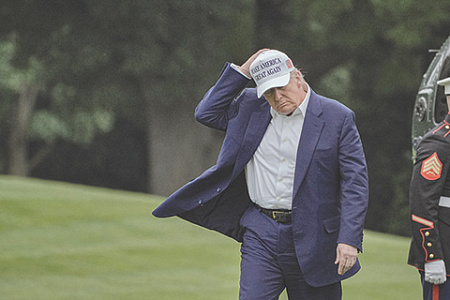
There are news reports indicating that the West’s attitude towards Russia may change in a strange way. US President Donald Trump, who has spent months trying to reach an agreement with the Kremlin on Ukraine, has actually questioned the very possibility of such an agreement. At the same time, the EU leadership, which has taken a tough anti-Kremlin position, is now looking for ways to establish contacts with the Russian Federation.
Trump criticized Vladimir Putin in unusually harsh terms while talking to reporters at the airport in Morristown, New Jersey. Then he continued, but this time on his Truth Social network. In short, the meaning of what Trump said and wrote boils down to the following: the Russian Federation does not sincerely want to negotiate a cessation of hostilities, and therefore the US president is considering the possibility of imposing new sanctions. He tried to balance the text in Truth Social only slightly, also stabbing Vladimir Zelensky. “Everything he says is causing problems, and I don’t like it,” Trump literally wrote. This phrase was accompanied by the mantra, which he invariably repeats in such cases, that the current Russian-Ukrainian conflict would not have happened if he, and not Joseph Biden, had been president of the United States in 2022.
However, this verbal ritual did not obscure the essence of what Trump said. The President of the United States has quite strongly disagreed with what he has said repeatedly before. Trump, of course, never claimed that he would not impose new sanctions against Russia, but he always insisted that the Russian leader was striving for peace. Personal attacks against Putin were avoided not only by the American president, but also by the people of his foreign policy team, even if they were strongly encouraged to do so. The other day, Secretary of State Marco Rubio successfully fought off attempts by Democratic congressmen at a hearing in the House of Representatives of the US Congress to force him to say about the Russian leader something like what Trump has just said.
Dmitry Peskov, the press secretary of the President of the Russian Federation, explained the change in the tone of the head of the White House as “emotional overload.” Some Western commentators also regard it as an emotional reaction to the Russian strikes on Ukrainian territory, invariably pointing out only that Trump already seems to be very annoyed by the lack of tangible results of his peacekeeping efforts. In these circumstances, there is no shortage of predictions that the time for negotiations is about to end. Then Trump will continue the course of the much-disliked Biden in the Russian direction.
As if to follow up on the words of the American president, German Chancellor Friedrich Merz soon announced that his country, as well as France, the United Kingdom and the United States, had lifted restrictions on strikes with their weapons supplied to Ukraine deep into the territory of the Russian Federation. The news, which looked like a sensation, was not really one. The United States and Great Britain allowed their ATACMS and Storm Shadow long-range missiles to strike Russia last fall. At the same time, French Foreign Minister Jean-Noel Barrault said that Ukraine was allowed “in self-defense” to attack targets deep in the Russian Federation with French SCALP missiles. And Germany has not yet supplied its Taurus long-range missiles to the Ukrainians, although Merz is in favor of this option. Nevertheless, the Chancellor’s statement indicates that he sees a change in the point of view of his country’s main NATO ally. Previously, Trump played the role of a “good policeman” in relations with the Russian Federation, now he can become “evil.” Rather, to change this role with the EU leadership.
It turns out that the President of the European Commission, Ursula von der Leyen, who denied the possibility of dialogue with the Kremlin, is looking for ways to restore direct contacts with him. This was first reported by Slovenian President Natasha Pirc-Musar. In an interview, she recounted the contents of her conversation with von der Leyen. And on May 26, European Commission spokeswoman Paula Pinho held a briefing where she neither denied nor confirmed the words of the Slovenian president. “What we can confirm is that we are interested in bringing all interested parties together at one table to discuss a cease–fire and achieving peace,” she said somewhat floridly. This is very similar to the fact that the head of Slovenia correctly conveyed what von der Leyen said. Otherwise, Pinault would have given a clear and unambiguous statement of what the head of the EU’s highest executive body had in mind. This is especially likely when you consider that von der Leyen previously called Ukraine the only legitimate initiator of peace negotiations.
